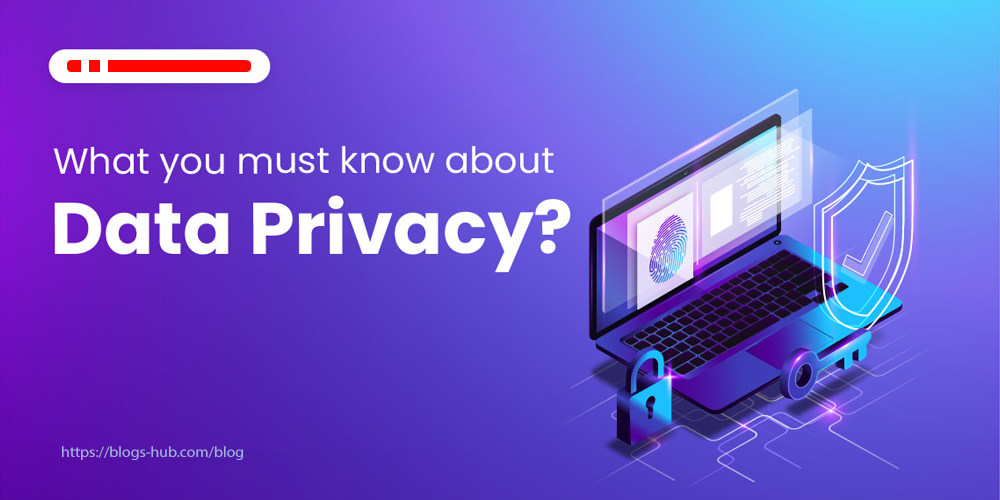Our complete reliance on cellphones for all of our needs is a result of dematerialization, which was made possible by digital transformation. Physical objects such as calculators, phones, CDs, DVDs, VCD players, and alarm clocks are being converted to digital form. Since smartphones have replaced many other goods, the question of "Is it safe to store our data on smartphones?" stems from the fact that service providers are handling, managing, processing, and maintaining our data.
Understanding Data Privacy: What You Need to Know
Digital interactions encompass business, government, health, finance, and one-on-one communication. Because hackers can readily change the data being kept, data privacy is a crucial issue that demands everyone's attention.
Data privacy: what is it?
Data privacy is the safeguarding of a person's personal information from unwanted access. The primary goal of data privacy is to correctly gather, store, process, manage, and preserve data while adhering to privacy and data protection laws and regulations. It entails policies, procedures, best practices, and methods to help organizations handle privacy complaints.
Generally speaking, data privacy includes the following components:
Data Governance
Global Requirements
Legal Framework
Policies
Practices
Third-party vendors
Why Is Data Privacy Vital?
A person's fundamental right to data privacy is the defense of that data against unlawful access. The information gathered is put to various uses.
● Managing the company for several objectives, including the use of AI and ML technologies.
● Delivering goods and services to customers.
● Gaining knowledge from data.
The goal of data privacy is to protect data from hacker attacks, illegal access, and breaches.
Both individuals and companies need to protect their personal information. Personally Identifiable Information (PII) may be at risk when a portion of an individual's data is disclosed. Unauthorized access to data can reveal a company's trade secrets and intellectual property, which over time can seriously damage the company's reputation. Data privacy is therefore increasingly crucial in today's digital world.
What information about data privacy is essential?
Many organizations are tackling the process of managing and processing the obtained data and making sure that it is being utilized with data compliance and rules in order to preserve individuals' rights to data privacy. You should be aware of the following information regarding data privacy.
1. Understand data privacy
People need to understand how online data is gathered, utilized, processed, stored, and kept up to date. Thus, having a self-awareness of data privacy aids in comprehending the precautionary steps to reduce data threats. To put it even more simply, we control our data privacy, and being conscious of it encourages us to stay awake when using the internet or revealing personal information.
2. Data protection and privacy are not the same thing.
Many individuals use these two names interchangeably and frequently seek clarification on them. Data privacy makes ensuring that the information is managed and kept safe in accordance with privacy laws. Data protection, on the other hand, is the practice of shielding data from hazards and unwanted access. While data protection guards against technical problems and cyberattacks, data privacy aims to set standards and norms for data access.
3. Data security and privacy are not the same thing.
While the terms "data privacy" and "data security" sound similar, they are not the same when it comes to security and assurance. While data security involves putting policies, procedures, and techniques in place to secure data, data privacy involves using appropriate compliances and regulations in the collection, storing, processing, and maintenance of the data.
4. Data Privacy is everyone’s responsibility.
It is everyone's duty to protect personal data. Even with the numerous laws and regulations pertaining to data privacy, we may still take certain preventative steps to lessen the dangers and leakage of data. In the modern world, a data breach is no little matter; it is time-consuming and does significant harm to both individuals and companies. If you become aware of a data breach, please notify it and take the necessary steps to recover, such isolating the affected area and disconnecting from a public Wi-Fi network, before bringing the matter to a professional.
5. Data Transparency is important.
Understanding how firms gather, access, handles, and appropriately store data is made easier with the aid of data transparency. The lawfulness, fairness, and transparency of the data should not be jeopardized by the data used. It is incumbent upon the organization to exhibit transparency with regard to the processing and management of personal data. Additionally, a person's right to be forgotten and reclaim data ownership is granted by privacy laws.
6. Privacy Rules and Statutes
There are other privacy legislation in place throughout the world in addition to the General Data Protection Regulation (GDPR), which is well known. Here are a few of them:
The California Civil Rights Act (CCPA)
The E-Privacy Rules
CPA, or the Colorado Privacy Act
California Privacy Rights Act (CPRA)
Virginia Consumer Data Protection Act (CDPA)
Data security strategies, tactics, plans, and best practices will vary as data privacy rules continue to develop.
Become Data Privacy Professional from InfosecTrain
Professionals with expertise in data privacy are highly valued in the cybersecurity industry and are paid well. A data privacy engineer typically makes between $124,112 and $147,112 annually. To help you prepare for and pass the certification test, InfosecTrain offers an instructor-led training and certification course on the Certified Data Privacy Solutions Engineer (CDPSE). Enroll right away if you want to become a certified Data Privacy Engineer.


